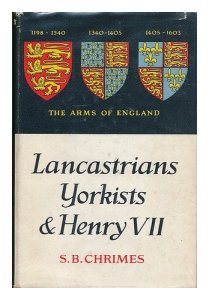Upon the recommendation of a respected history friend, I purchased a used copy of this book. In my pursuit to learn more and understand the Wars of the Roses, it appeared this would be a valuable read. It is easy to get confused among all the descendants of King Edward III and the possible contenders for the English throne in the fifteenth century. I also had enjoyed Chrimes biography of King Henry VII.
My friend was right, this is an excellent book. In the forward, Chrimes tells us the origins of the term “Wars of the Roses” and how it didn’t come into being until the eighteenth century. He swears he will not use the term in the course of the book and he keeps his promise. The only thing I’m wondering is what, if anything, the people of the time period called the conflict. This question is not answered.
Chrimes begins with the children of King Edward III and traces the roots of the family feud to John of Gaunt’s son Henry of Bolingbroke’s usurpation of the throne from his cousin King Richard II. This was the beginning of the Lancastrian dynasty which lasted until the deposition and eventually the death of King Henry VI in 1471. The first section of the book describes the Lancastrian dynasty, how it came into being and how it ends. The second section of the book tells us about the rise of the Yorkists. He goes into great detail about the reign of King Edward IV and how he reestablished a strong working government after the lapses of the Lancastrian kings.
After the sudden death of King Edward, the House of York divided itself with Richard III usurping the throne from his nephew. Chrimes’ point of view is that Richard started out strongly but after the death of his heir, Prince Edward, followed by the death of his wife, Anne Neville, things began to unravel. It was too soon after Richard took over and some Yorkists defected to Henry Tudor. Henry was an unlikely heir assumptive to the throne, having only a weak at best claim and no experience in government or military matters. Richard should have won the Battle of Bosworth but there was no controlling the behavior of the Stanley’s or Henry Percy, Earl of Northumberland.
It was clear the powers that be were tired of the civil strife. Henry Tudor’s oath to marry Elizabeth of York promised peace. Chrimes is very complimentary of Henry Tudor’s grasp of governing and stresses how he kept in place the Yorkist administration, exploiting and expanding on it. The book includes many pictures from illuminated manuscripts of the central characters and my copy has a family tree of Edward III and a map of England with areas marked for Lancastrians and Yorkists. The entire panoply of characters are presented here in a concise retelling of the history. Chrimes is fair-minded and even-handed, not taking sides or judging and all of this is done with an amiable and kindly sense of humor. I was sorry the book ended and will likely use it for reference in the future.



I’ve never heard of this writer before, I think I need to check him out! I suspect that the people of the time didn’t really call the wars anything in particular or if they did it was probably just a name related to which Lord they were fighting for. It would have been hard to give a name to everything until after it was finished. In the same way that the Hundred Years War couldn’t be called that until it was done or that WWI was the Great War until sadly there was Second World War, hindsight gives wars their name.
LikeLike
All good points Melissa.
LikeLike
I am interested in your assertion that “Chrimes tells us the origins of the term “Wars of the Roses” and how it didn’t come into being until the eighteenth century.” I have always understood that the phrase “Wars of the Roses” was first used by Sir Walter Scott in the nineteenth century. Could you please give us Chrimes’ source for it first being used in the eighteenth century.
You also say “The only thing I’m wondering is what, if anything, the people of the time period called the conflict. This question is not answered.” According to Philippa Gregory the conflict was known at the time as “The Cousins’ War”.
LikeLike
I’d be happy to give you Professor Chrimes source. He says on page xii in my addition of this book that the Scottish Enlightenment philosopher and historian David Hume was the first to use the expression. In his “History of England” written in 1761, Hume writes of “the wars between the two Roses” and also of the “quarrel between the two roses”. In a footnote, Chrimes also cites a reference from 1646, “The Commonplace Book of Sir John Oglander” where the expression “the quarrel of the Two Roses” is used, so that would indicate even earlier. As far as PG, she is not an historian, she is an author of books. There is no factual, historical contemporary reference of any sort to ‘the Cousins’ War’. It is a marketing term invented to sell books.
LikeLike